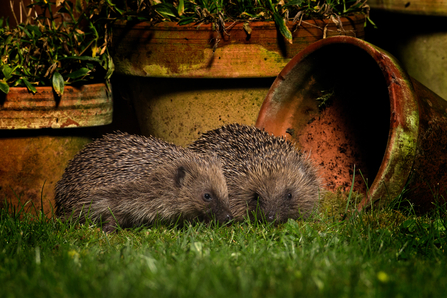
Credit Jon Hawkins - Surrey Hills Photography
Hedgehogs are nocturnal mammals and one of the three British mammals that hibernate through winter (usually November - mid March depending on the weather). Hedgehogs have few natural predators with badgers being the main one, but dogs and foxes can also seriously injure or kill hedgehogs. The decline in hedgehog populations is not fully understood, but habitat loss and fragmentation, and the reduced availability of food due to pesticide use are likely to play a part. A hedgehog’s diet mainly consists of slugs, worms and other invertebrates, so the hedgehog is definitely the gardener’s friend. Wet dog or cat food can be offered to hedgehogs to supplement their diet, but never feed a hedgehog bread and milk.
Signs of a sick or injured hedgehog
Staggering behaviour during the day and in winter - Staggering is an indicator of hypothermia, which hedgehogs are particularly susceptible to. It should be noted that it is not uncommon for hedgehogs to change their nesting site during the hibernation period, so if you see a hedgehog on the move during winter and it looks healthy and isn’t staggering it may not need any help. Sleeping on the lawn - Healthy hedgehogs will only sleep in a nest and not out in the open. Very small hedgehog seen close to winter - Hedgehogs need to have a certain amount of body fat in order to survive hibernation. A healthy hedgehog should weigh a minimum of 450g by the start of November. If you are concerned that a hedgehog looks too small it can be weighed on kitchen scales and, if necessary, looked after over winter by someone with experience of caring for hedgehogs.
How to handle a sick hedgehog
Handling a hedgehog can be extremely stressful for the animal so only handle them if it is essential and limit the amount of handling time. Before handling a hedgehog prepare a high sided cardboard box with screwed up newspaper or a towel inside so the hedgehog can hide. Wear a pair of thick gardening gloves and use both hands to scoop the hedgehog up from underneath. Fresh water and wet cat/dog food should be made available, but don’t attempt to force feed. The box should be kept somewhere quiet, dark and warm. If you are concerned about hypothermia a hot water bottle can be filled with hot tap water (not boiling), wrapped in a towel and placed in the box. It should feel warm to the touch and it is essential that is it removed before it goes cold.
Who to contact for help
For advice about sick, injured or underweight hedgehogs, in the first instance, please contact:
British Hedgehog Preservation Society - 01584 890801
Further help or advice can be obtained from:
RSPCA - 03001 230708
Or, contact your local vet if you are concerned that the animal is injured.
Dead hedgehogs
Report online at Garden Wildlife Health http://www.gardenwildlifehealth.org
The information provided supports research into diseases and other threats to British Wildlife.
